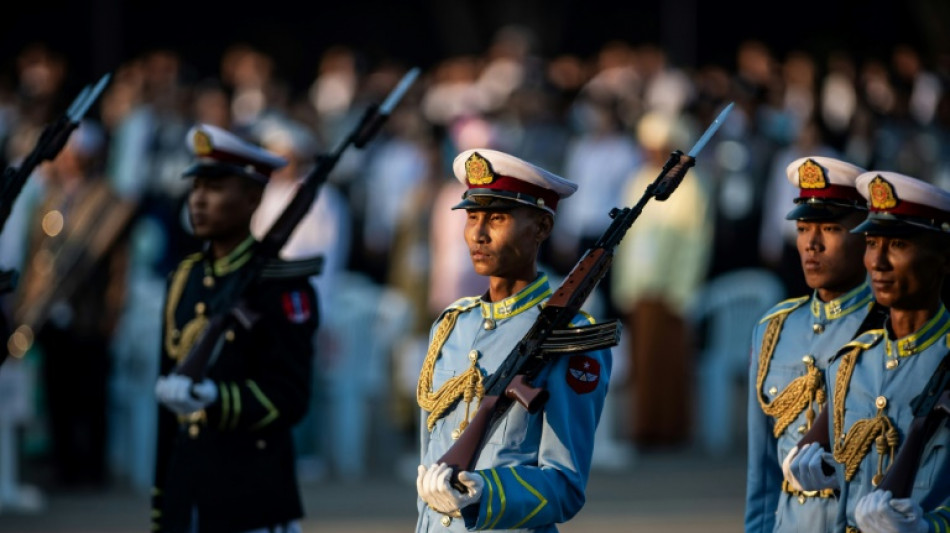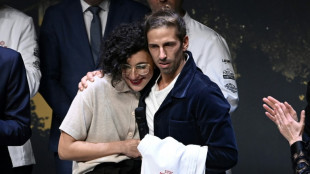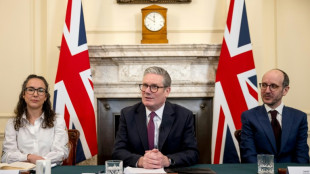

Myanmar junta chief insists on polls at annual military parade
Myanmar's junta chief insisted Thursday that a planned election will go ahead despite the country's spiralling civil war, in a speech to thousands of soldiers and dignitaries at the annual Armed Forces Day parade.
Min Aung Hlaing condemned the array of armed groups fighting his rule as "terrorist insurgents" driven by "warlordism", after a year of seismic battlefield defeats.
Russian-made jets roared overhead and troops paraded though the remote, high-security capital Naypyidaw for the event, which has become progressively smaller in the four years of civil war since the military deposed Aung San Suu Kyi's civilian government.
Min Aung Hlaing said the authorities were sticking to a plan announced earlier this month that a long-promised election would go ahead -- despite much of the country being outside junta control.
"The State Administration Council, acting on behalf of the Tatmadaw, currently assuming the responsibility of the nation, is making provisions to hold the general election this coming December," he said.
The State Administration Council is the junta's official name for itself, and the Tatmadaw is another term for the Myanmar armed forces.
He repeated the unsubstantiated allegations of fraud by Suu Kyi's victorious National League for Democracy (NLD) party in the 2020 election that the military has used to justify its coup of February 2021.
The junta has lost the key northern town of Lashio -- including a regional military command -- and swathes of the western Rakhine state since the last Armed Forces Day. It has also sought to conscript more than 50,000 people.
The civil war pits the junta's forces against both anti-coup guerillas and long-established ethnic minority armed groups.
Min Aung Hlaing said "provisions are being made to ensure that all eligible voters can exercise their right to vote" and urged opponents to lay down their weapons and pursue dialogue.
- Increasing air strikes -
More than 3.5 million people are displaced by the conflict, half the population live in poverty and one million civilians face World Food Programme aid cuts next month following US President Donald Trump's slashing of Washington's humanitarian budget.
At the same time, trade sanctions have isolated Myanmar, making it increasingly dependent on China and Russia for economic and military support.
"The military has never been defeated this severely," said Jack Myint, a non-resident fellow at the Center for Strategic and International Studies think tank.
However, observers agree its grip on the centre is secure for now.
"The reality is they still have a superior supply of arms," said Myint, and they "don't have to defeat everyone to maintain control".
War monitors say the past year has seen a spike in air strikes by the junta's Russian-made jets.
Eleven people, including a doctor, were killed when a clinic in western Myanmar was bombed on Saturday, residents said, one week after a bombardment in the heartlands killed 12 people, according to a local official.
- Beijing's influence -
The past year has shown how strong a hand Beijing holds in Myanmar, with a willingness to play off the military and its opponents to pursue economic opportunities and stability on its borders, according to analyst Myint.
After public concern spiked in China over scam centres in Myanmar, thousands of workers were repatriated at Beijing's demand.
"Beijing sees all these smaller players in the sandbox like insolent children not getting along," Myint said.
"They whip out the carrot one time, they whip out the stick the next, and hold it together in a manner that best serves their interests."
Western governments have said no election held under Myanmar's current military government can be free or fair.
But cliques in the junta are pushing for polls to weaken Min Aung Hlaing's position amid discord over his handling of the conflict, according to one US-based Myanmar analyst speaking on condition of anonymity.
Min Aung Hlaing serves as both acting president and commander-in-chief but he would have to relinquish one of those roles to hold an election.
"Min Aung Hlaing does not want to hold the election," the analyst said. "But generals close to him have warned that the situation is getting worse."
U.Kremev--LiLuX



